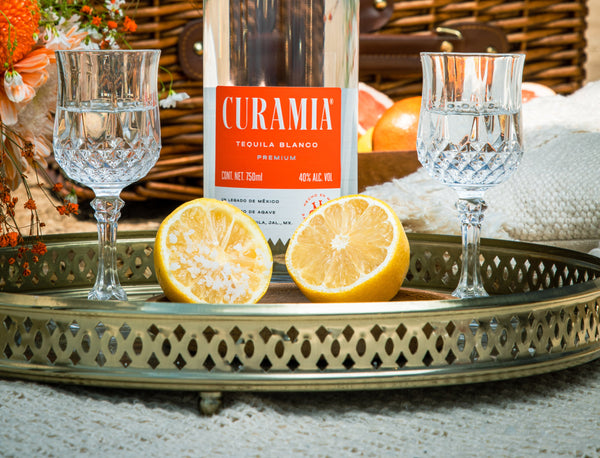We all know what tequila is, right? It’s that liquor we buy every once in a while to take shots of or throw into a margarita. How does the saying go again? One tequila, two tequila, three tequila, floor? In actuality, the importance of tequila is much deeper. And its roots go back long before bars started introducing the wildly popular margarita cocktails you know today.
To think about tequila’s history—or the cultural significance of tequila—requires a journey back to the days of the Aztecs. The tequila we all know and love can be traced back as far as 1000 B.C.
When Was Tequila Invented?
The history of tequila begins anywhere from 1000 B.C. to 200 A.D. It was during this period that the Aztecs began fermenting agave to enjoy as a drink. Originally known as “pulque”, the milky liquid developed such a strong significance that the Aztecs worshipped two gods as a result of it. Mayahuel, the goddess of the maguey, and Patecatl, the god of pulque, became significant because of their relationship to the drink that was said to have a relaxing and euphoric effect on those who consumed it.
So, when did the drink begin to look more like the spirit we enjoy today? It all started when the Spanish arrived in modern-day Mexico.
The Spanish Influence on Tequila’s History
When the Spanish invaded the Aztec Empire in 1519, they brought with them a knowledge of distillation—a tactic that would radically transform the pulque they discovered. When the brandy they brought with them from mainland Europe ran out, the Spanish Conquistadors began experimenting with mud and agave, eventually creating a drink they called mezcal wine. The result was a potent spirit that would eventually become one of the world’s most popular liquors.
On top of their ability to distill, the Spanish also had the power to start producing on a commercial scale, which played a big role in tequila’s history in Mexico. By the mid-1700s, Don José Antonio de Cuervo founded Taberna de Cuervo following a land grant from King Ferdinand VI of Spain. Does the name sound familiar? By 1795, the Cuervo family had produced their first mezcal by cultivating, harvesting, and distilling the famous blue agave plant. By 1880, they began bottling the spirit for commercial distribution. Fast forward to today and it would be tough to enter a liquor store and not find José Cuervo tequila.
The Growth of Tequila, Jalisco
Named after the volcanic rock from the dormant volcano that shadows the town, tequila’s history starts in the heart of Jalisco. Founded in 1530 by the Ticuila tribe, Tequila, Jalisco would go on to become the home base for all things, well, tequila. With the arrival of the Spanish Conquistadors came significant change. What once was a tribal village would become the epicenter of tequila production by the late 18th century.
With its growth came newfound wealth and popularity. In 2003, the Mexican government officially designated Tequila as a "Pueblo Mágico", highlighting both its historical significance and charm. Today, the town stands as a vibrant destination for locals and visitors from around the world. Of the 150 distilleries you’ll find across Jalisco, 20 reside in Tequila, including José Cuervo and Casa Sauza.
A Surge in Popularity
As tequila’s history and cultural significance began to touch more corners of the globe, the spirit would become ingrained in the lives of many. For example, during Prohibition, which lasted from 1919-1933, tequila was smuggled into the U.S. in large quantities. In other words, consumers couldn’t get enough.
In 1974, the Mexican government declared the term “tequila” as intellectual property, making it illegal for other countries to produce or sell their own versions. The move was made in large part to protect tequila’s heritage and ensure the consistent quality of the spirit, which had taken the world by storm.
Curamia: Honoring the Cultural Significance of Tequila
Through studying its rich history, it’s easy to understand why tequila is more than just a spirit. Tequila’s history and cultural significance in Mexico transcends mere consumption, encompassing elements of identity and national pride. Understandably, the drink is a vital part of Mexican culture, symbolizing the country's heritage, craftsmanship, and resilience. In many ways, it embodies the spirit of Mexico, reflecting its diverse landscapes and vibrant culture. Even beyond the borders of Mexico, tequila’s history has shaped it as a drink for celebration and adventure. That’s why our traditional approach to tequila is so important at Curamia.
Inspired by tequila’s history, Curamia is driven to deliver an authentic taste of Jalisco while reshaping the industry as we know it. Our founder, Dafna Mizrahi, is on a mission to share the true spirit of Jalisco with the rest of the world through pure, additive-free tequilas. Our products are female-owned, female-made, and crafted for all to enjoy. Experience why Curamia is a tequila for the bold by exploring our tequilas.
FAQs
When was tequila invented?
Although it is impossible to give an exact date, tequila’s history began between the years of 1000 B.C. and 200 A.D.
Why does tequila have to come from Mexico?
Similar to Champagne from France or port wine from Portugal, tequila can only be produced in Jalisco and select areas in neighboring Mexican states. This is due to its Denomination of Origin status, granted in the 1970s and recognized internationally.
What is the historical association of tequila with salt and lime?
The history of salt and lime with tequila dates back to the 19th century. This is because the early versions of the spirit tended to burn a lot, so drinkers found a way to enjoy the spirit more.
What role does the Tequila Regulatory Council play in the tequila industry?
Established in 1994, the Tequila Regulatory Council plays a pivotal role in the industry, overseeing and regulating all aspects of production, from cultivation to bottling.
How has the perception and use of tequila evolved in modern bartending?
In modern bartending, tequila has evolved from something you shoot to a sophisticated liquor that can be savored in creative cocktails of all types.




